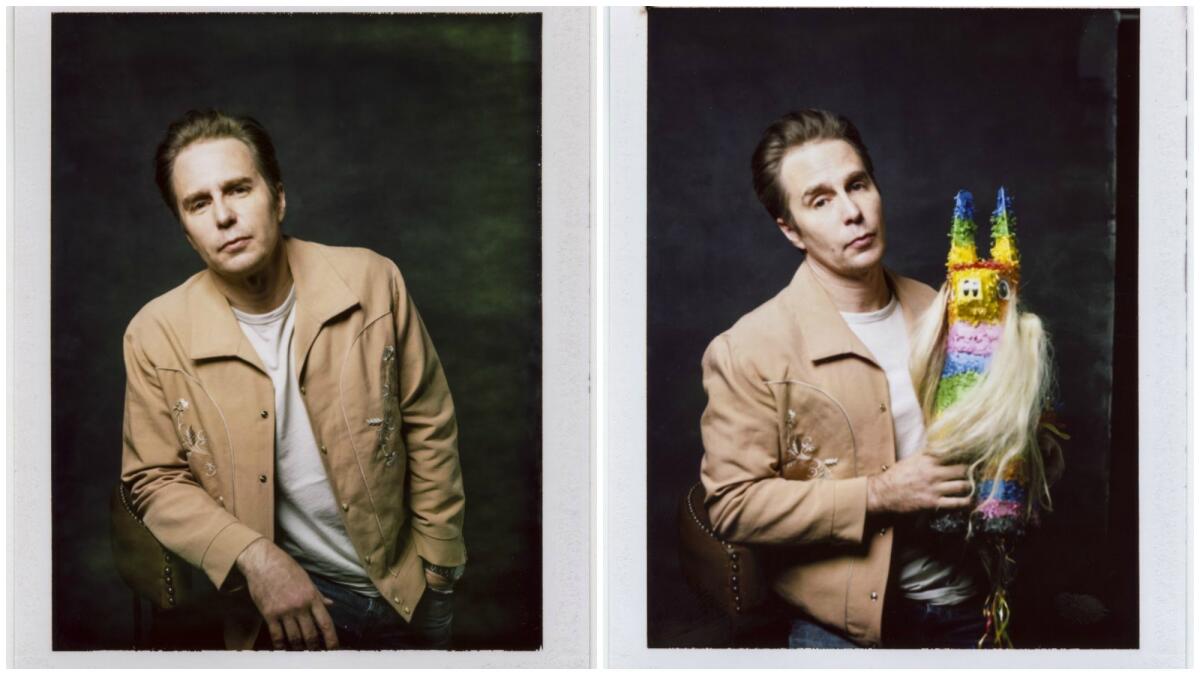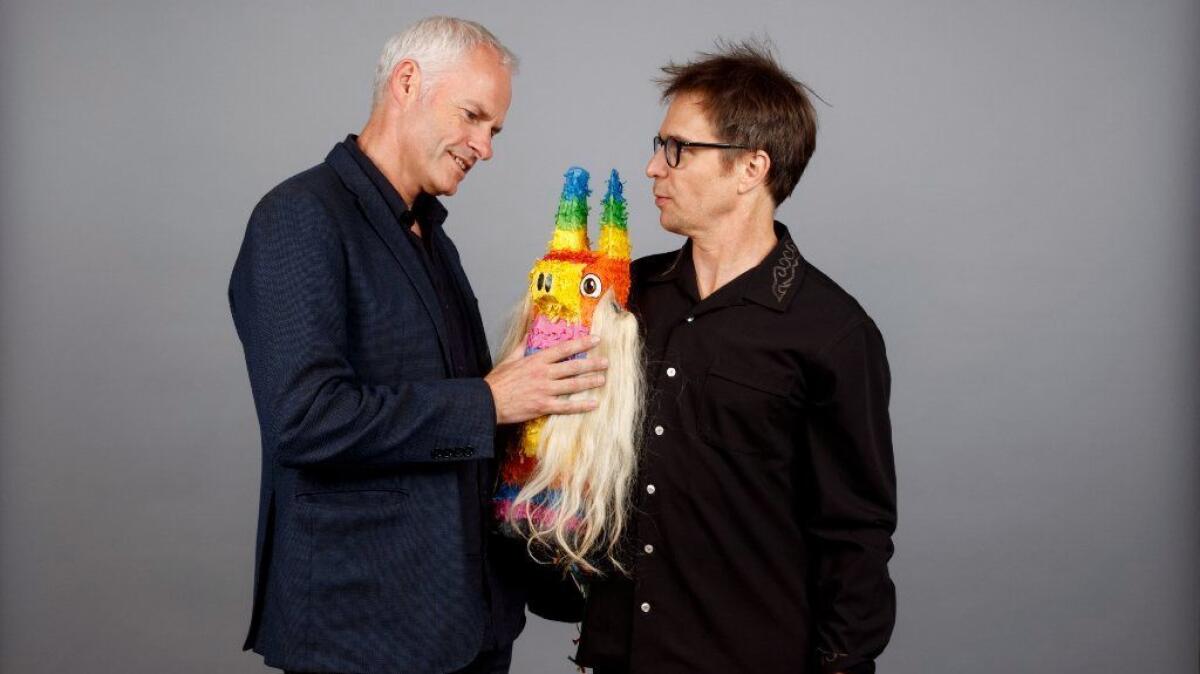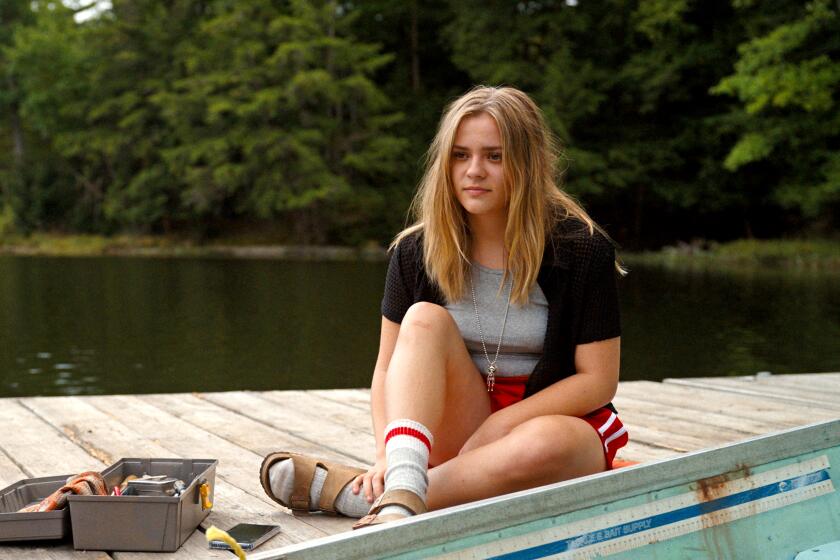‘Three Billboards Outside Ebbing, Missouri’ could finally be Sam Rockwell’s ticket to awards season
Please excuse Sam Rockwell if he’s feeling a little exhausted lately.
He’s been channeling former President George W. Bush for “The Big Short” director Adam McKay’s next film, “Backseat,” which stars Christian Bale as former Vice President Dick Cheney and Amy Adams as his wife, Lynne. The unusual role is just the latest in a wildly varied professional career that has averaged two movies a year for the last 20 years.
“I’d like to slow down. I think I need to slow down a little bit. I’m a little tired. But you take the work when you can get it, I guess,” the New York-based Rockwell said last month at Hollywood’s Chateau Marmont.
He was briefly in L.A. as part of an ongoing tour supporting “Three Billboards Outside Ebbing, Missouri,” which won the coveted audience award at this year’s Toronto International Film Festival -- following a rapturous reception at the Venice Film Festival -- and is expected to be a major player in multiple categories this awards season.

The film, which opens Nov. 10, also marks Rockwell’s third collaboration with writer-director Martin McDonagh after the play “A Behanding in Spokane” and the ensemble film “Seven Psychos.”
“I think I probably saw him in ‘Lawn Dogs’ but it didn’t quite register until I saw ‘Confessions of a Dangerous Mind,’ how versatile and how smart and how fun he was as an actor,” McDonagh said of when he first took notice of Rockwell. “I caught up [with] everything he’d done up to that point. Especially ‘Moon.’ ”
Sipping fresh mint tea and accompanied at the Chateau by his loyal 11-year-old dog Sadie, Rockwell is nothing like his “Three Billboards” character, Jason Dixon, an unapologetically racist small town police officer who becomes an unexpected ally in the quest of divorced mother Mildred Hayes (Frances McDormand) to bring her late daughter’s rapist-murderer to justice. Nevertheless, McDonagh wrote Dixon with Rockwell in mind.
“There is a type of American male that is very useful for me to have Sam’s voice in my head as I’m writing,” McDonagh said. “There’s something loose and dangerous as a guy, maybe, quirky and unexpected. It’s a testament to how great an actor he is -- how unafraid he is to go to those very dark places without sentimentalizing the character. There’s something lovable about [Rockwell] as a person but he doesn’t lay anything on top of that.”
FULL COVERAGE: Holiday movie preview >> »
Rockwell spoke about working with McDonagh, the unexpected relevance their film has with today’s headlines and the challenge of playing a former president.
Besides Martin McDonagh writing this role for you, what drew you to “Three Billboards”?
It was just a great part. The journey this guy takes is just amazing, you know? Barney Fife into Travis Bickle. It was really fun, that journey. And then we kind of marked it out so it wouldn’t be too comedic. We wanted to make sure it didn’t get too goofy so you could follow the guy as it went along.
What did you do to prepare for the role?
I am very anal about my preparation. I just go and go. No rock unturned kind of thing. I went to southern Missouri and did some ride alongs with cops. It was intense. They were like stopping drug dealers and stuff like that. I had them tape my lines, for a good accent. There was a drug house that was pretty awful. The thing with watching “Cops” is you don’t get that smell. Feces, drugs. It was just a horrible smell in there. Really bad.
Frances McDormand is a force of nature in this movie. What was it like working opposite her?
She’s intimidating, but she’s also a real softie. She’s serious, but we had a lot of fun, we had a lot of laughs. I can’t imagine anyone else putting out the fire on those billboards. I believe she would really do that -- kicking the kids in the …. I’m not saying Fran would do that, but there’s something about it that I believe when I watch Fran. But she’s also very soulful, you know? She has a lot of vulnerability and warmth, and you see that in the movie. She’s John Wayne.
You’re getting a lot of awards buzz for your performance, but you were in a similar situation for “Conviction” and ultimately not nominated for any top awards. What was that experience like?
We were riding the wave there for a second. It was fun. [Director] Tony [Goldwyn] and I did a little press tour with Hilary [Swank]. I think Christian [Bale] was the guy that year for “The Fighter.” And then [Jeremy] Renner too, who is a pal of mine, [for “The Town”]. It was like the three Boston toughs. And then Christian was just sweeping. We were all at the Critics’ Choice. We were there having fun, we all knew Christian was gonna get it so we all got drunk and just laughed. We were just there for the party.
Speaking of Christian Bale, some photos have emerged online with him in full makeup as Dick Cheney. He’s unrecognizable.
I look a little different, but [Bale and Adams] look really different. It’s intense. He gained some weight and then he’s got a suit on. He’s got eyebrows. He shaved his head. He gets picked up at 2 in the morning. He’s not sleeping at all. I have a prosthetic nose, that takes a couple of hours.
Have you ever met President Bush?
I’ve never met him. I met his daughter briefly, she was really sweet. [Playing him] is challenging, like playing Elvis Presley or something. I’m on the internet listening to him constantly. I feel like I haven’t slept, just watching him. I have like four more days in December, and then I’m done [shooting].
“Three Billboards” is obviously a fictional story but touches on a lot of timely issues as well. Even at the London Film Festival you were asked questions about Harvey Weinstein. How have you been feeling about the flood of stories of sexual harassment and assault lately?
It’s disgusting. It makes me embarrassed to be a white male -- I mean a male, period. It’s an embarrassing time to be a white male right now. I just played a KKK guy with Taraji P. Henson [for the film “The Best of Enemies”]. It’s about him and a civil rights activist that Taraji plays. I talked to an ex-white supremacist. He said something really interesting -- it’s not so much that you hate black or brown people, it’s that you hate yourself. I think that’s what going on with Jason Dixon in “Three Billboards.’ And a lot of these public people that we’re talking about, too.
All that ... -- misogyny, racism -- comes from self-hatred and not being able to go to therapy and figure ... out. You have intimacy issues. You’re some kind of sex addict. Maybe if Jason Dixon had gone to therapy, he’d be a little better. I am a therapy believer. Especially if you’re a crazy actor -- you’ve gotta go to therapy. We’re neurotic. If there’s a scene that I can’t crack, sometimes I’m like, “Maybe this is too personal,” so I’ll talk about it with the shrink. I guess that’s my spirituality. I’m not really religious. I do a little yoga. I like breathing and stretching and … like that. And talking about your feelings.

This story is part of The Times’ Holiday movie preview. See our complete coverage here.
More to Read
Only good movies
Get the Indie Focus newsletter, Mark Olsen's weekly guide to the world of cinema.
You may occasionally receive promotional content from the Los Angeles Times.











